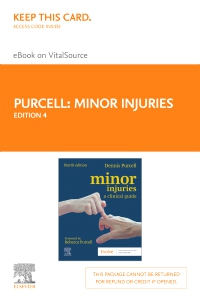
Minor Injuries - Elsevier eBook on VitalSource (Retail Access Card), 4th Edition
Elsevier eBook on VitalSource - Access Card

Now $43.69
As nurses and other healthcare professionals become increasingly responsible for triage, assessment and treatment of minor injuries, this comprehensive training manual offers clear, reliable and up-to-date guidance for all those working in this rapidly changing field.
The first text of its kind, written by former nurse practitioner Dennis Purcell, Minor Injuries has been fully revised in its fourth edition and reorganized into a more logical structure. It provides easy-to-follow guidance on all common presentations occurring in children, adults and older patients, taking the reader through each region of the body and providing core anatomy and examination principles to support treatment decisions.
This popular text is richly illustrated throughout and will be indispensable for trainees undertaking minor injuries courses as well as practising nurses, emergency nurse practitioners, paramedics and advanced practitioners working in standalone minor injury units.
-
- Simple and accessible – takes you through the body step by step
- Beautifully illustrated, now with more images (many based on the author’s own designs)
- Diagrams highlight anatomy, types of injuries, techniques such as suture, photos of examination procedures, and X-rays
- 11 videos showing examination of all limb joints, the cranial nerves, chest, neck and back
- Aligned with current NICE and SIGN guidelines
-
Part 1: First principles
1. Minor injuries: an overview
2 Clinical examination and the written record
3. X-rays and the emergency nurse practitioner as referrer
Part 2: Limb injuries
4. Basics of musculoskeletal injury
5. Basics of musculoskeletal examination
6. The shoulder
7. The elbow
8. The forearm, wrist and hand
9. The pelvis and hip
10. The knee
11. The lower leg
Part 3: Midline injuries
12. Minor head injuries
13. The face, the eye and ENT
14. The spine
15. The chest
Part 4: Wounds and burns
16. Wounds and burns


 as described in our
as described in our 